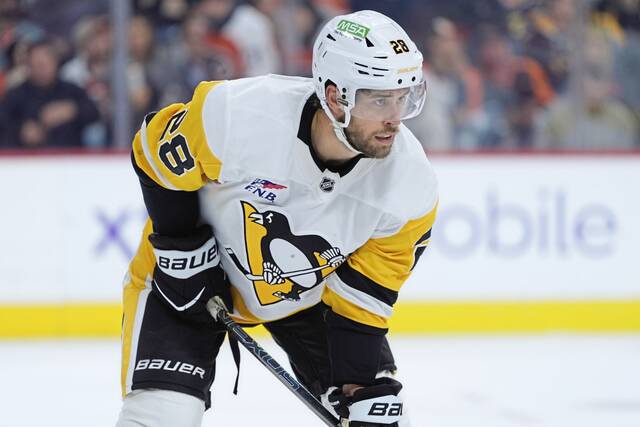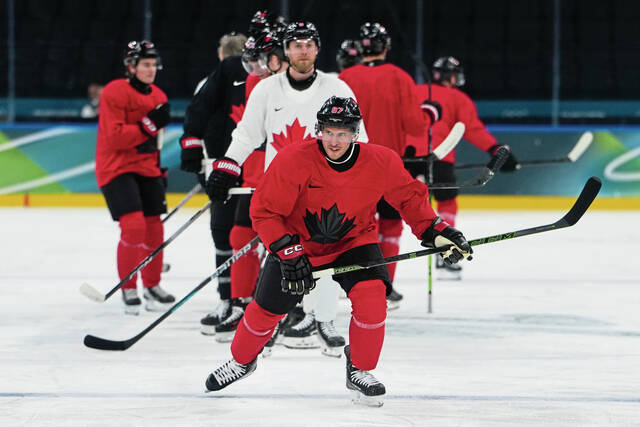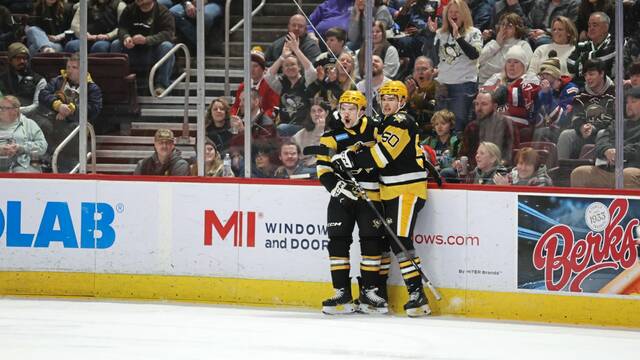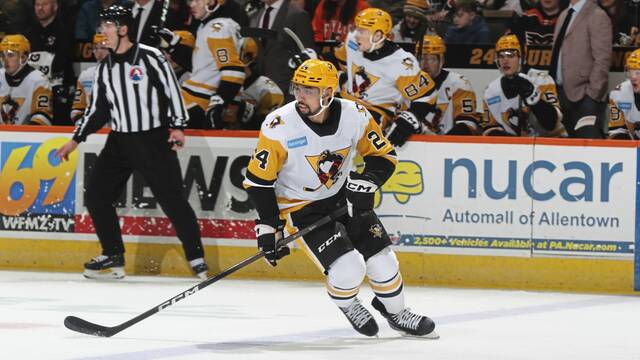While the NHL is on hold because of the ongoing coronavirus pandemic, the Tribune-Review will offer the Double Team project, an examination of the five best players who have contributed substantially to the Penguins and another franchise. For consideration, a player must have played at least the equivalent of a full season for each franchise. (Sorry, Jarome Iginla fans.)
Today, a look at the Vancouver Canucks. The franchise dates to 1945 when the Canucks existed as a Pacific Coast Hockey League team before joining the Western Hockey League in 1952. By 1970, the NHL expanded into Vancouver and brought the team, stocked with former NHL players, into the league. The Canucks are named after a slang term that refers to Canadians.
In 120 all-time games against the Canucks, the Penguins have a 67-40-13 record.
1. Markus Naslund, left winger
The Penguins’ 1996 trade of Naslund to the Canucks for Alek Stojanov often is cited as the worst transaction in franchise history. And make no mistake, it was hideous from the Penguins’ perspective. Naslund became a franchise pillar for the Canucks, and Stojanov lasted all of 45 games in Pittsburgh.
But in all reality, had Naslund remained with the Penguins, he likely would not have met his potential. A first-round pick in 1991, Naslund debuted in 1993-94 and spent parts of three seasons with the Penguins. But given all the depth the team had in the early to mid-1990s, Naslund was relegated to a bottom-six role and didn’t have the skill set suited to be a checking forward in that era of the NHL.
His best season with the Penguins was his last when he put up 52 points in 66 games in 1995-96 before being dealt to Vancouver.
Even after the deal, Naslund didn’t gain immediate traction in his new surroundings. After scoring 21 goals and 41 points in 78 games during 1996-97, Naslund regressed the following season as he was limited to 34 points in 76 games and was even a healthy scratch under abrasive coach Mike Keenan.
Midway through 1998-99, Keenan was replaced by Marc Crawford, and Naslund’s game took off as he scored 36 goals and 66 points in 80 games and was selected to an All-Star Game for the first time.
By 2000-01, Naslund was named captain. Teamed with power forward Todd Bertuzzi and playmaking center Brendan Morrison on the West Coast Express line, Naslund scored 41 goals as well as 75 points in 80 games and led the Canucks to their first playoff appearance in five years.
One of the greatest Swedish players in NHL history, Naslund would record three consecutive 40-goal seasons, including his signature campaign of 2002-03 when he set career-highs with 48 goals and 104 points. That effort earned him the Lester B. Pearson Award, which recognizes the league’s top overall player as voted on by NHLPA members.
In all, Naslund spent 12 seasons in Vancouver, served as captain for eight and was selected to five All-Star Games. By the time he left to join the New York Rangers as a free agent in July of 2008, he held most of the franchise’s career scoring records.
2. Matt Cooke, left winger
Cooke’s NHL journey started in Pittsburgh during the 1997 draft at Civic Arena when he was selected in the sixth round by the Canucks. Debuting in 1998-99, Cooke didn’t break through as a full-time NHLer until the 2000-01 campaign when he appeared in 81 games and put up 27 points as well as 94 penalty minutes.
The following season, Cooke played in all 82 games, posted 33 points and, given his rambunctious style of play, a team-leading 111 penalty minutes.
Cooke’s best season in Vancouver was 2002-03. Appearing in 82 games, he set a career-high with 42 points and even garnered enough votes to finish ninth for the Frank J. Selke Trophy, the award for the league’s top defensive forward.
Cooke spent the first nine seasons of his NHL career in Vancouver before being dealt to the Washington Capitals at the 2008 trade deadline. By the following offseason, he joined the Penguins as a free agent. His time with the Penguins was successful but tumultuous.
Lining up with Tyler Kennedy and Jordan Staal, Cooke gave the Penguins a reliable presence on the third line that mixed an element of physicality with a touch of offense. That trio helped batter the exhausted Red Wings in the 2009 Stanley Cup Final and was vital to the franchise’s third championship.
A steady threat to reach double-digit goals during his five seasons in Pittsburgh, Cooke was also a steady threat to the opposition. After missing 21 games throughout the 2010-11 season because of suspension for various infractions, Cooke underwent counseling and extensive one-on-one coaching to clean up his game.
In 2011-12, Cooke appeared in all 82 games and incurred only 44 penalty minutes, the lowest total in his career since debuting in the late 1990s. He even earned the team’s nomination for the Bill Masterton Memorial Trophy, which recognizes sportsmanship and dedication to hockey.
After walking a straight line throughout the shortened 2012-13 season — only 36 penalty minutes in 48 games — Cooke was allowed to walk as a free agent and joined the Minnesota Wild in July 2013.
3. Jiri Slegr, defenseman
Slegr spent 11 seasons in the NHL and played for six teams, but his greatest sustained success came with the Canucks and Penguins.
A second-round pick in 1990, the Czechoslovakian-born Slegr debuted with the Canucks in 1992-93, appearing in 41 games and scoring 26 points (and recording an ample 109 penalty minutes) for the Smythe Division champions. The following season, Slegr set a career-high with 38 points in 78 games for the Canucks.
Despite that success, Slegr was a healthy scratch throughout the postseason as the Canucks reached the Stanley Cup Final for the second time in franchise history, losing to the Rangers.
Early in the lockout-shortened 1994-95 season, Slegr was traded to the Edmonton Oilers. After two seasons in Edmonton, Slegr was on the move again, traded to the Penguins in August 1997.
Joining a team with several other Czech players such as forwards Jaromir Jagr, Martin Straka and Robert Lang, Slegr found an immediate fit with the Penguins. A fireplug of a defenseman at 6-foot-1 and 210 pounds, Slegr offered a blend of stout defense with a little offensive pop during parts of four seasons in Pittsburgh.
In 1997-98, Slegr, a member of the Czech Republic team that won the Olympics that winter, helped the Penguins win the Northeast Division title by scoring 17 points in 73 games while also recording 109 penalty minutes.
Slegr’s best season with the Penguins was 1999-2000 when he scored a career-best 11 goals as well as 31 points in 74 games.
Midway through the 2000-01 campaign, Slegr was traded to the Atlanta Thrashers. After winning the Stanley Cup with the Red Wings in 2002, Slegr returned to Vancouver as a free agent in September 2003. His second stint with the Canucks was brief, lasting only 16 games before he was traded again, this time to the Boston Bruins in January 2004.
4. Jarkko Ruutu, left winger
Penguins general manager Ray Shero had a penchant for signing left wingers from the Canucks who could make the opposition madder than a hornet. Two years before signing Cooke, Shero inked Ruutu as one of his first signings after taking over as Penguins general manager in the 2006 offseason.
It didn’t take Ruutu, a native of Finland, long to become a fan favorite in Pittsburgh, thanks to an easily chanted name (or at least one syllable of it) and his ability to agitate the opposition with a big hit or just flat-out obnoxiousness.
Helping the Penguins reach the postseason for the first time in six years in 2006-07, Ruutu put up 17 points and a team-leading 125 penalty minutes
By 2007-08, Ruutu settled into a role on the third line with Staal and Kennedy. He appeared in 71 games, scored 16 points and racked up 138 penalty minutes, five of which came after a wild fight against Maple Leafs forward Darcy Tucker on Jan. 3, 2008.
In the postseason, Ruutu played in 20 games, recorded three points and helped the Penguins reach the Stanley Cup Final, losing to the Red Wings. The following offseason, he joined the Ottawa Senators as a free agent.
A decade earlier, Ruutu was drafted in the third round by the Canucks. After debuting in 1999-2000, Ruutu broke through as a full-time NHLer in 2003-04. Appearing in 71 games, he scored 14 points and racked up 133 penalty minutes for the Northwest Division champions.
Following the 2004-05 lockout, Ruutu’s final season in Vancouver of 2005-06 saw him play in 82 games, recording 17 points as well as a team-leading 142 penalty minutes.
5. Barry Wilkins, defenseman
Acquired from the Boston Bruins in the 1970 expansion draft, Wilkins will forever hold a place in Canucks history having scored the franchise’s first goal in a 3-1 home loss to the Los Angeles Kings on Oct. 9, 1970.
Beyond that milestone, Wilkins was one of the Canucks’ most reliable players during the franchise’s early years. In three of his first four seasons in Vancouver, Wilkins played in at least 70 games and reached the 20-point mark in each of those campaigns.
He was also a fairly physical player, as evidenced by his ability to reach the 100-penalty minute mark three times during his Canucks career.
Early in the 1974-75 season, Wilkins was dealt to the Penguins. In Pittsburgh, Wilkins enjoyed his greatest individual success. During 1974-75, he set a career-high with 35 points in 66 games and reached the postseason for the first time in his career.
Wilkins’ second and final season with the Penguins in 1975-76 saw him record 27 assists in 75 games and once again, qualify for the postseason.
During the ensuing offseason, he joined the Edmonton Oilers of the World Hockey Association.
Honorable mention: Nick Bonino, center; Kevin McCarthy, defenseman; Petr Nedved, center; Tracy Pratt, defenseman; Brandon Sutter, center.
Note: Previously, this article was published with defenseman Dale Tallon ranked No. 5. Following a review, he was replaced by Wilkins.








